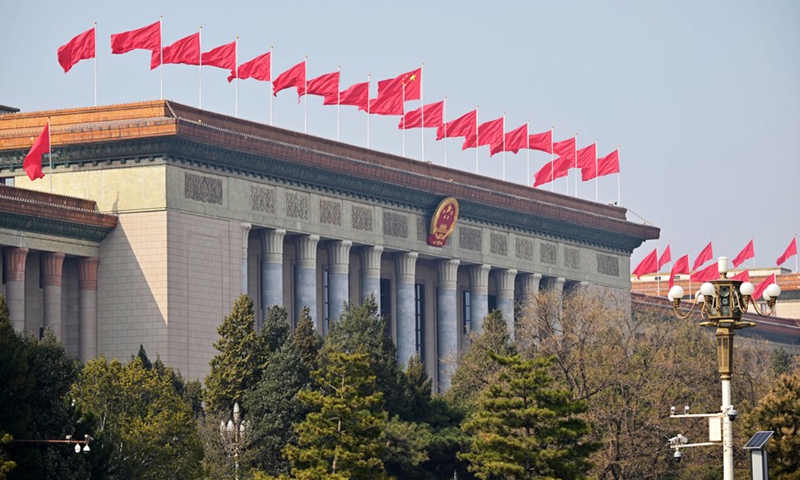
This photo taken on March 4, 2023 shows the Great Hall of the People in Beijing, capital of China. Photo: Xinhua
Chinese lawmakers will deliberate a range of drafts and amendments at the 10th session of the Standing Committee of the 14th National People's Congress (NPC), the country's top legislature, scheduled for June 25 to 28.
One of the highlights is the draft amendment on
frontier health and quarantine. The draft improves measures of routinely preventing the cross-border transmission of infectious diseases, and strengthen the protection of business secrets and personal information involved in national health quarantine, according to Huang Haihua, spokesperson of the Legislative Affairs Commission of the NPC Standing Committee.
Under the draft, customs authorities are responsible to require inbound and outbound personnel to undergo temperature checks and medical inspections as general quarantine inspection measures.
Depending on the situation, further quarantine inspection measures such as medical examinations may be implemented for selected inbound and outbound personnel.
Besides the
frontier health and quarantine amendment, legislators on the four-day meeting will also deliberate a draft law emergency response work, a draft amendment to the country's accounting law, and draft revisions to the public security administration punishments law and the cultural relics protection law.
It was the second time the draft amendment on public security administration punishments was reviewed. The amendment specifies that when dealing with administrative cases, police will face punishment if they edit, delete, destroy, or lose audio and videos related to a case. They will be held accountable if crimes are committed.
The amendment also suggests the expressions "damage the spirit of the Chinese nation" and "hurt the feelings of the Chinese nation" in the first revised bill are strong subjective and could generate varying interpretations, making it difficult to define in legislation and enforce in law enforcement. It suggests the wording be removed.
According to Huang, the amendment draft on dealing with emergency that submitted for review may adjust the emergence responding levels into a category of four, with the first level being the highest. It considers entitling county-level governments to decide its own emergency responding levels based on situations.
Global Times




